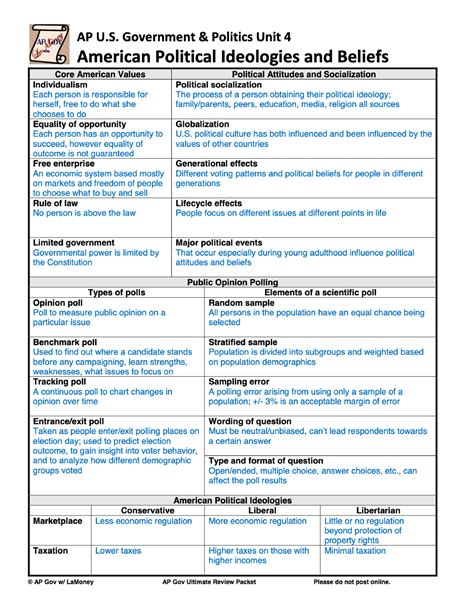Ace the Advanced Placement (AP) Government and Politics Unit 4 exam with our comprehensive multiple-choice question (MCQ) guide. This thorough resource covers the key concepts, theories, and institutions that underpin the American political system.

1. Introduction to the Framework of American Government
-
MCQ 1: Which of the following is a fundamental principle of American government?
- (A) Popular sovereignty
- (B) Limited government
- (C) Separation of powers
- (D) All of the above
-
Answer: D
- Explanation: All three principles are foundational to the American political system: popular sovereignty refers to the idea that the government derives its authority from the consent of the governed; limited government acknowledges that government’s powers are restrained by constitutional and legal limits; and separation of powers divides government authority among different branches, preventing any one branch from becoming too powerful.
2. Powers and Structure of the Federal Government
-
MCQ 2: The Constitution delegates which of the following powers specifically to Congress?
- (A) Regulating interstate commerce
- (B) Conducting foreign policy
- (C) Enforcing laws
- (D) Declaring war
-
Answer: A
-
Explanation: The Commerce Clause of Article I, Section 8 of the Constitution explicitly grants Congress the power to regulate commerce with foreign nations and among the several states.
-
Table 1: Powers of the Three Branches of Government
| Branch | Powers |
|---|---|
| Legislative (Congress) | Makes laws; declares war; approves treaties; confirms appointments |
| Executive (President) | Enforces laws; conducts foreign policy; commands armed forces |
| Judicial (Courts) | Interprets laws; decides cases and controversies |
3. Federalism and State Government
-
MCQ 3: According to the Tenth Amendment, which powers are reserved for the states?
- (A) Those not delegated to the federal government
- (B) Those enumerated in the Constitution
- (C) Those prohibited by the Constitution
- (D) None of the above
-
Answer: A
- Explanation: The Tenth Amendment states that “The powers not delegated to the United States by the Constitution, nor prohibited by it to the States, are reserved to the States respectively, or to the people.” This principle of reserved powers ensures that states retain substantial autonomy in areas such as education, local government, and criminal law.
4. Civil Liberties and Civil Rights
-
MCQ 4: Which amendment guarantees freedom of religion?
- (A) First
- (B) Fourth
- (C) Fifth
- (D) Sixth
-
Answer: A
-
Explanation: The First Amendment of the Constitution includes the Establishment Clause, which prohibits the government from establishing a religion, and the Free Exercise Clause, which protects the right to practice religion.
-
Table 2: Key Civil Liberties Guaranteed by the Bill of Rights
| Amendment | Civil Liberty |
|---|---|
| First | Freedom of religion, speech, press, assembly, and petition |
| Fourth | Protection against unreasonable searches and seizures |
| Fifth | Right to due process of law; protection against self-incrimination |
| Sixth | Right to a fair trial, including the right to an attorney |
5. Political Participation and Elections
-
MCQ 5: Why is voter turnout in the United States generally low compared to other developed democracies?
- (A) Lack of meaningful choices in elections
- (B) Strict voter registration requirements
- (C) Apathy and lack of civic engagement
- (D) Excessive campaign spending
-
Answer: C
-
Explanation: Studies have shown that a lack of civic engagement and apathy are major contributing factors to low voter turnout in the United States.
-
Table 3: Voter Turnout in the United States
| Year | Voter Turnout (%) |
|---|---|
| 1960 | 63.8 |
| 1980 | 53.9 |
| 2000 | 51.3 |
| 2020 | 66.1 |
6. Interest Groups and Political Parties
-
MCQ 6: Which type of interest group primarily represents the interests of businesses?
- (A) Trade association
- (B) Public interest group
- (C) Citizen action group
- (D) Labor union
-
Answer: A
- Explanation: Trade associations focus on promoting the interests of specific businesses or industries, such as the National Retail Federation, which represents the retail industry, and the American Petroleum Institute, which represents the oil and gas industry.
7. Mass Media and Public Opinion
-
MCQ 7: How has the internet impacted the media landscape?
- (A) Expanded access to information and increased diversity of viewpoints
- (B) Led to increased polarization and the spread of misinformation
- (C) Both A and B
- (D) None of the above
-
Answer: C
-
Explanation: The internet has both democratized access to information and created new opportunities for the spread of misinformation and the reinforcement of existing beliefs.
-
Table 4: Media Ownership and Concentration
| Media Type | Number of Companies Controlling the Majority of Market Share |
|---|---|
| Television networks | 6 |
| Radio stations | 8 |
| Newspapers | 25 |
| Internet search engines | 2 |
Conclusion
Mastering AP GOV Unit 4 MCQ is essential for success on the exam. By understanding the key concepts, theories, and institutions of American government, you can demonstrate your comprehension of this complex system. Utilize this guide as a valuable resource to enhance your knowledge and prepare for the challenges ahead.
